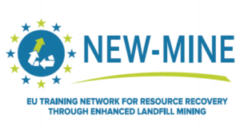On September 10-12, 2018, the Summer School “To mine or not to mine – A multi-criteria assessment of the landfill mining of municipal and industrial solid waste deposits” took place in Leuven, Belgium. The summer school was a joint initiative of the EU Horizon 2020 ETN NEW-MINE and ETN SOCRATES projects, in collaboration with the EIT RawMaterials IMAGINE programme. 43 MSc/PhD students and professionals of 23 different nationalities participated. Here we reflect on three days of interactive sessions, learning about multi-criteria assessment of landfill mining and resource recovery projects (LM, 11/10/2018)

Background for Summer School
Resource scarcity, climate change and increased pressure on environment and health necessitate the transition from a fossil-based, linear economy to a low-carbon, circular economy. What was considered as waste in the past, becomes a resource for tomorrow. Increasing attention is given to the possibility of mining and/or reprocessing of municipal and industrial solid waste deposits (see ELFM-video April 2018). But is it really feasible to mine these secondary deposits? Do we have the appropriate technology? Is it economically feasible to do this? Does the mining of these deposits indeed contribute to a safer environment and health situation? Does it lead to a new CO2 reductions? And do people want a mining project “in their backyard”?
The Summer School aimed at offering an integral approach for the assessment of landfill mining projects, going beyond technical assessment, offering an approach to determine the value of landfill mining from an economic, environmental, social, policy and business perspective. In three sessions, the participants were trained in different aspects of the assessment of ELFM projects.
Session 1 – “Multi-criteria assessment of Enhanced Landfill Mining Projects – An interdisciplinary training programme for ELFM projects”
This session was organised by the NEW-MINE project, focussing on municipal solid waste containing landfills and applying concepts being developed within the project by the PhD students In an introductory lecture, Karel Van Acker (KU Leuven, Belgium) introduced the requirement of a holistic approach to decide on a particular landfill management type.
For the assessment of landfill mining case-studies, three scenarios were introduced, being a (1) “do-nothing scenario”, i.e. no landfill mining, combined with mitigating the impact of a landfill through permanent monitoring of surface and ground water combined with water treatment and gas capturing; (2) Classic remediation, i.e., excavation of a landfill combined with re-landfilling in a sanitary landfill and/or incineration of the light fraction of the landfill; (3) Enhanced Landfill Mining – as studied in the NEW-MINE project, in which mining is combined with the aim of maximising recovery of resources from the landfill.

Figure 1: ETN NEW-MINE scheme for comparing various scenarios, ranging from Do-Nothing to Enhanced Landfill Mining
Following the introductory lecture, different aspects of the assessment were introduced. Steven Van Passel (University of Antwerp and Hasselt University, Belgium) introduced the techno-economic assessment of landfill mining projects, while Niclas Svensson (Linköping University, Sweden), introduced the life-cycle assessment of landfill mining projects. Subsequently, Johan Springael. (University of Antwerp, Belgium) gave an introduction to Multicriteria Decision Analysis, in which techno-economic, environmental and socio-economic aspects (including the so-called social licence to operate) are combined to come to motivate a decision on which landfill management approach to select.
Session 2 – “Industrial flowsheeting and thermo-economic assessment”
Session 2 was organised by the SOCRATES project. SOCRATES studies the development of near-zero waste processes for the recycling of low-grade metal containing industrial waste streams, such as bottom ashes, copper tailings and slags and sludges from the non-ferrous industry, commonly deposited in industrial landfills and tailing ponds. Markus Reuter and Alejandro Abadias (Helmholtz-Zentrum Dresden-Rossendorf, Germany) illustrated how novel near-zero waste flowsheets for the treatment of these residues are assessed within the SOCRATES project. Focus of the session was on the primary copper production flowsheet (from rock to metal), in which two scenarios were compared, being production of copper without treatment of wastes and with additional metal recovery from wastes (slags and drosses). The analysis was performed through composing a mass and energy balance of the flowsheet and performing an exergy analysis and life cycle assessment.

Figure 2: Christina Meskers (Umicore) @ Summer School To mine or not to mine? (Sep’ 2018)
Session 3 – “From the lab to the market, business development & commercialisation”
The third and final Session focussed on the steps to be taken to evolve from a lab invention to a commercial product. Two lectures were given: one by Christina Meskers (Umicore, Belgium) on the upscaling of technology throughout different technology readiness levels and the associated business case assessment at each upscaling step; A second lecture was given by Nicolas Menou (EIT RawMaterials, Belgium), focussing on creation of a start-up to exploit novel technology.
In the second part of the session, students were challenged to draft a pitch on the commercialisation of 2 technologies selected from the SOCRATES and NEW-MINE projects. For each technology, 4 groups competed for the best company idea. Two groups were selected as winners; i.e. the company “Rotten Tomatoes”, exploiting sensor-based sorting technology from the NEW-MINE project for sorting of tomatoes, and the group InCLeach, exploiting chloride leaching technology from the SOCRATES project for the near zero-waste recycling of low-grade residues.
The winners

Figure 3: Rotten Tomatoes @ Summer School To mine or not to mine? (Sep’ 2018)

Figure 4: InCleach @ Summer School To mine or not to mine? (Sep’ 2018)
Acknowledgements
- The NEW-MINE project has received funding from the European Union’s EU Framework Programme for Research and Innovation Horizon 2020 under Grant Agreement No 721185.
- The SOCRATES project has received funding from the European Union’s EU Framework Programme for Research and Innovation Horizon 2020 under Grant Agreement No 721385.


